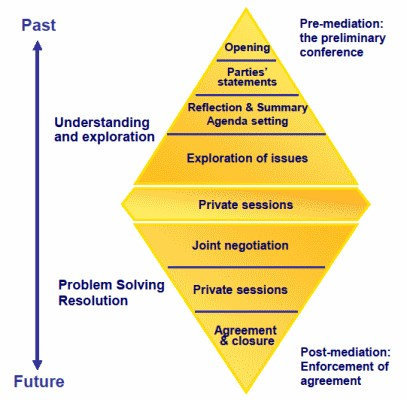Mediation is future focussed, child-focussed in parenting matters and solution oriented. It is a proven process whereby a neutral or impartial person, the mediator, helps the people in dispute (the parties), to discuss and re-evaluate the issues in a safe, respectful and confidential environment in order to come up with solutions of their own making, typically resulting in an outcome each party can live with and which least interrupts their lives. It is at no time a round and round in circles slanging match raking over the issues of the past.
Mediation Stages
- Mediator’s Opening Statement – explains her role and the ground rules – one to speak at a time in a respectful manner note: can take “time out” if upset or lacking control; neutrality/ impartiality of mediator; confidential process.
- Parties Statements and Mediator’s Summaries (each tells their side of the matter without interruption by the other).
- Identification and Listings of Issues – agree order of items to be discussed
- First joint explanatory negotiation through direct communication between the parties (pinpointing and listing any proposed options).
- First private meeting – a confidential and private, one on one meeting with each party (either party may request time out as needed).
- Second joint negotiation – nutting out the agreement (can include further private/one on one meeting with the negotiators).
- Concluding joint negotiation to fine tune all agreements made.
- Mediator photographs white board and later off-site writes up the agreement, finalises, emails to parties.
- Parenting order filed with the Court to make it enforceable, or it is agreed that it is not necessary to do so.
- Terms of Property Settlement fine-tuned, agreed and provided to the Parties’ lawyers for filing with the Court as Consent Orders thus concluding any litigation on foot.
Mediation is a flexible process that can be adapted to suit the parties and the circumstances. The model (below) gives you an idea of the process.

Exceptions to the requirement to attend family dispute resolution mediation in Parenting Matters
Section 60I(9) of the Family Law Act 1975 (Cth) lists the exceptions to the requirement to attempt Family Dispute Resolution (FDR) before making an application for court orders. Some of the main exceptions are as follows:
- A person is applying for procedural orders, interim orders or consent orders
- The matter is urgent
- Family violence or child abuse has occurred
- There is a risk of violence or child abuse if there was to be a delay
- Where it is not practical for the person to participate in FDR, for example, incapacity, physical remoteness or some other reason
- Where a person has contravened and shown a serious disregard for a court order made in the last 12 months